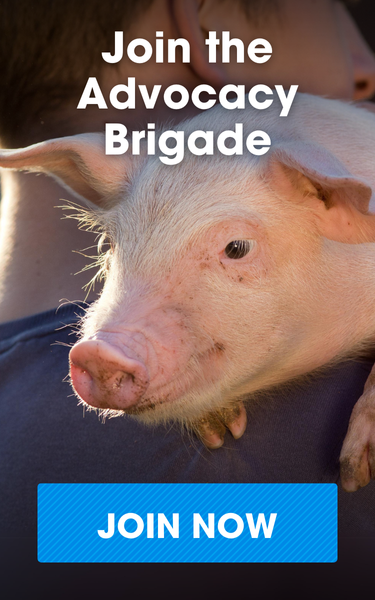
Five Times 2019 Proved We Need a Factory Farm Detox

In polling, 94% of Americans agree that farmed animals deserve to live free from abuse and cruelty. Yet the majority of the nearly 10 billion farm animals raised for food each year in the U.S. live on “factory farms”—industrial facilities that raise large numbers of animals in intensive confinement. Every year the horrors of factory farming for both humans and animals come more clearly into focus, but 2019 was especially eye-opening:
Dangerous meat and poultry recalls were up 83% since 2013.
A 2019 report from Public Interest Research Group [PDF] based on USDA and FDA data showed that recalls of meat and poultry rose drastically between 2013 and 2018—a time period when an increasing proportion of our food came from factory farms. Beef recalls were up by 55%, pork recalls by 67% and poultry recalls by 70%. Even more concerning, the report found that Class 1 recalls of meat and poultry—which represent the highest risk of health problems or death from consumption—rose by a whopping 83%.
Unsustainable cattle ranching set the Amazon on fire.
Uncontrolled fires raged in the Amazon last year, devastating a critical natural resource. The World Wide Fund for Nature (WWF) states on its website that 80% of deforestation in the Amazon is attributable to cattle ranching. According to Brazil’s space research center, there was an 83% rise in the number of fires in the first eight months of 2019 compared with the same time period in 2018. Yet global demand for this unsustainable beef is only growing, with beef exports from Brazil reaching a record 1.8 million metric tons in 2019.
Investigations into multiple major dairy farms revealed extreme abuse of calves.
In June, an animal rights group released a series of videos showing workers at a major dairy facility throwing calves off the back of trucks and into their pens, dragging them by the ears, hitting them in their faces with plastic milk bottles, kicking them and stabbing them with rebar. These videos prompted consumers and retailers across the country to boycott the brand, but a series of investigations at other dairies followed. Dishearteningly, all of them showed abuse and neglect of baby calves, who are too often treated as a disposable byproduct of the industrial dairy system.
USDA allowed cruel, high-speed pig slaughter.
Despite years of work to fight this dangerous proposal, the USDA finalized a rule that removes all pig slaughter speed caps and shifts oversight of slaughterhouse operations from federal inspectors to already overworked company employees. This increases the potential for egregiously cruel treatment of pigs, jeopardizes workers safety—as detailed by this Human Rights Watch report—and puts food safety and consumers at risk.
Factory farms blocked neighbors from suing over toxic air pollution.
After farm neighbors in North Carolina sued Smithfield Foods, the biggest pork company in the country, over toxic air pollution from manure—and won—the industry struck back, introducing more misleadingly named “right to farm” laws across the country. These laws prevent communities from seeking meaningful legal recourse even if their air, water, property values or personal health are compromised by waste from these giant industrial facilities.
The problem of factory farming is vast, but the solution starts with each of us. Resolve to make a real difference for animals, the planet and your health by joining our Factory Farm Detox, a one-week commitment to eliminate factory farmed foods from your diet. We’ll give you all the tools you need to kickstart new habits and send a clear signal to the food industry that it’s time for change. Make 2020 the year you stand up against factory farming!

